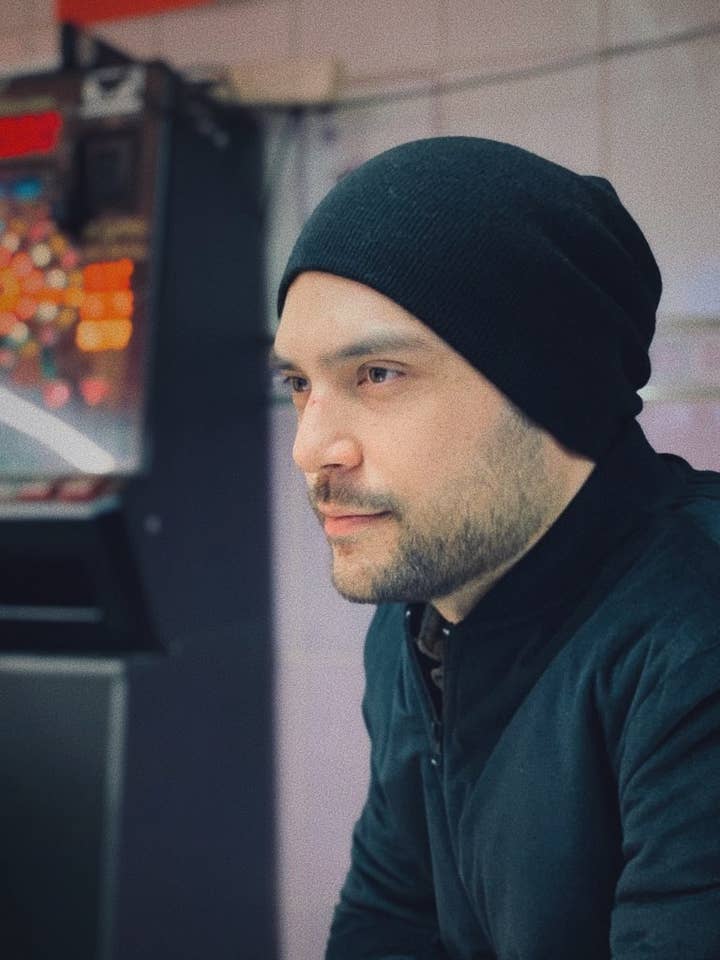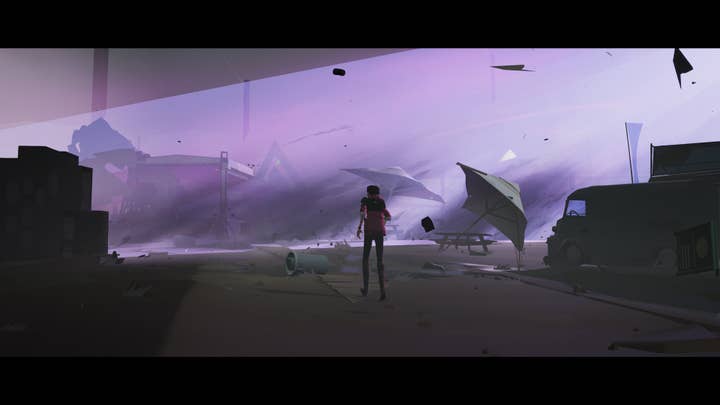Somerville is Chris Olsen's game, and it is not a puzzle platformer
Jumpship's co-founders clear up some misconceptions and wrestle with how devs get credited for their work
Jumpship released a new trailer for Somerville during E3, and the reception has been positive, to say the least.
The Somerville trailer was featured in The Verge and The LA Times' roundups of the best trailers of the show, and landed the game in "Best of E3" articles from PC Gamer, The Guaridan, CNET, and more.
Even so, Jumpship co-founder and Somerville director Chris Olsen says it was not an unqualified success. Speaking with GamesIndustry.biz last week, Olsen says people seem to be a little more in the dark about what Somerville is than the studio had originally intended.
"There's a few things the trailer was supposed to inform people about what kind of game it is," Olsen says.
For example, some commenters described the game as a 2D puzzle platformer, the sort of game where the character "must move blocks and cubes to find their way around the world." And to be fair, the trailer does briefly show a character pushing a cart of some sort along rails. But it also shows characters walking into and out of the screen, which Olsen said was meant to cue people into the fact that it allows for full 3D movement.
"I'm the kind of person who would do this interview or whatever, but I really just want to go down into my hole and not be looked at, or seen, or talked to. I just want to work on the thing"
Chris Olsen
While Olsen clearly doesn't want to give much about the game away, he insists Somerville is "definitely not a platformer" of any stripe, cinematic, puzzle, or otherwise.
So what is it? Olsen says he knows, but isn't exactly sure how to communicate to outside world, something he realized when he was previously asked by a journalist what sort of game Somerville is.
"I couldn't quite describe it in a way that made it fit into a mold, essentially," Olsen says. "At the time, [the journalist] was like, 'Sounds like you need to get your pitch together' or something like that, but in my own head, I was really happy I couldn't say exactly what it was. It definitely feels like something I've not played before, both mechanically and the way the story is told.
"So that misconception of it being a puzzle platformer about manipulating items to get on top of them and all these things... I'd say it has some of that DNA -- sort of -- but we've gone so far away from that now it's become its own thing. All I really feel comfortable calling it now is 'a sci-fi adventure.'"
Olsen says some of that is Jumpship's own fault. After all, the studio has been working on Somerville for years but said next to nothing about it, and the studio hasn't provided much information on the game yet, leaving a vacuum for others to fill with speculation and erroneous assumptions. (Although he does add some things people have guessed based on the trailer have been right on the money.)

"We're not the kind of place that's devlogging everything and updating people," Olsen says of Jumpship. "We kind of revel in the ambiguity of the game as well. I like mystery, I really am not interested in constantly updating people as to how things are going... I'm the kind of person who would do this interview or whatever, but I really just want to go down into my hole and not be looked at, or seen, or talked to. I just want to work on the thing."
The studio's penchant for ambiguity also kept the trailer from spelling out more clearly what players would do in Somerville.
"I always like an escalation to anything to do with that sense of ambiguity," Olsen says. "We could easily show our hands for all the bombastic or more exciting things that happen in the game. But I don't want to. I want to set a tone and then for the players to discover the real exciting peaks about it. Rest assured, it's not just about what you have seen in the trailers."
Jumpship has always been a bit nebulous about what Somerville is, so it's no surprise some people get it wrong. But one thing Jumpship has always been explicit about is whose vision Somerville represents, and people have been missing the mark there as well.
When Jumpship was first announced in 2017, the press release described Somerville as "an original IP based on a personal project by Chris." But because Olsen was a relative unknown coming from feature film animation and Jumpship co-founder Dino Patti had also co-founded Limbo and Inside developer Playdead, the headlines and social media chatter often centered Patti at the expense of Olsen.
"There's this misconception that it's my game, I think," Patti says. "But this is Chris' project. When we met, it was because I saw what Chris was doing at that point and he was doing it alone. So we decided to build up a studio around him."
Olsen says he doesn't blame the press for focusing on Patti's history in games, but feels "embarrassed" for having it brought up so regularly in relation to Jumpship.
"You work on a film, and it's all credited toward the director, but little do they know that 16 writers have taken a pass at the script, and little do they know all the sequences that had nothing to do with the director..."
Chris Olsen
"As a studio, they're very much bunkered down," Olsen says. "And if I put myself in their shoes, when I'm bunkered down on making a thing, I don't want to hear my name being said when I'm busy developing something. I want it to be said when I want to come out and say something."
And of course, centering the conversation on Patti denies Olsen credit in a thing he had been working on for years before he and his co-founder even met.
"I worked in the film industry and the reason it kind of ruffled my feathers a little bit is that in the film industry, there's so much miscommunication as to who did what," Olsen says. "You work on a film, and it's all credited toward the director, but little do they know that 16 writers have taken a pass at the script, and little do they know all the sequences that had nothing to do with the director...
"That's something I'd like to clear up going into games; that's why I put the credits block at the end of the trailer. You can see for yourself who did what. And that works for me as well. Our staff have ownership over what's going on in the game. We're saying, 'You did that,' and in saying that, they have the responsibility of knowing that publicly, they're the person responsible for that. And I really like that and think it's a positive thing."
But if Olsen wants to be known as the vision holder for Somerville, does that not risk overshadowing the contributions of the rest of the team, perpetuating the very problems he detailed with the film industry?
"With these games where there is a single vision holder, there's almost nothing happening in the game that doesn't go through the lens of the vision"
Dino Patti
"It's a hard one," he concedes. "It's really seductive to put single people up. It's also easier to say 'This person for everything.' I get that. It doesn't present well when you go, 'This person did this and this person did this and this person did this...' You want a clear approach. I talked to the team, and all I care about is that at least I have shown to the public each person's roles. If I were to take anything from film, it is the respect they have for that credits sequence, and the credit block that goes on the poster. It really isn't about a singular entity if you really dig just one level deeper.
"So although I can't constantly name individual people all the time because it gets too messy, I can at least try my best to say that if you're going to talk about the animation, talk about Brendan [Body], who's the lead animator. Go contact him if you want to talk about animation, because even though I come from an animation background and I do a lot of animation, he really has taken that mantle and he should be known as the person who's responsible for the level of animation that's in there. I can at least try, and that's what the credit block at the end of the [Somerville] trailer is about. And I wish it were a thing in all trailers. It flashes up for one second, but at least at the end someone can pause and go, 'Ok, who did what?'"
Patti agrees about the importance of crediting everyone for their work, but doesn't see singling out the person bringing everything together as an inherently bad thing.
"With these games where there is a single vision holder, there's almost nothing happening in the game that doesn't go through the lens of the vision," Patti says. "Just like you talk about a Quentin Tarantino film, a Hideo Kojima game, a Fumito Ueda game, they are so much into everything to create the right style around a game. I feel the style is created if one director is good at saying, 'This is the style,' and making everybody line up with [that].
"While everybody should be credited, I don't have a problem with singling out Chris a bit more... Chris could probably not do this alone, but this game would not exist if he were not there."


